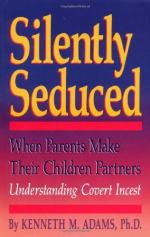|
This section contains 6,044 words (approx. 21 pages at 300 words per page) |

|
SOURCE: "Original Vice: The Political Implications of Incest in the Early American Novel," in Early American Literature, Vol. XXIII, No. 2, 1988, pp. 188-201.
In the essay that follows, Dalke argues that the incidents of unconscious incest in early American novels indicate a concern with social instability.
The first American novel and many of its most popular successors incorporate a striking motif: that of unconscious incest. Eight times before 1830, the early American novel raises the possibility of unwitting incest. The discovery usually results in madness or suicide; only once does the threat prove specious. By dwelling on such disastrous consequences, the earliest American novelists expressed no literal fear of widespread incest, but rather a fear of the dreadful condition incest symbolizes: the absence of a well-defined social system. They used a story of thwarted love to express, obliquely, deep anxiety about ease of social movement.
The first American novelist, William...
|
This section contains 6,044 words (approx. 21 pages at 300 words per page) |

|


